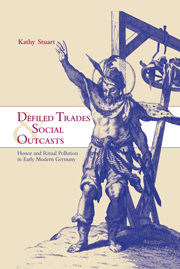Book contents
- Frontmatter
- Contents
- List of illustrations
- Acknowledgments
- List of abbreviations
- Glossary
- Introduction: defiled trades
- PART I THE MEANING OF DISHONOR IN EARLY MODERN SOCIETY
- PART II THE DISHONORABLE MILIEU
- PART III PARADOXICAL DISHONOR: PUNISHMENT AND HEALING
- 5 The infamous fur coat, or the unintended consequences of social discipline
- 6 The executioner's healing touch: health and honor in early modern German medical practice
- PART IV ARTISANAL HONOR AND URBAN POLITICS
- Conclusion: dishonor and the society of orders
- Selected bibliography
- Index
- CAMBRIDGE STUDIES IN EARLY MODERN HISTORY
6 - The executioner's healing touch: health and honor in early modern German medical practice
Published online by Cambridge University Press: 06 August 2009
- Frontmatter
- Contents
- List of illustrations
- Acknowledgments
- List of abbreviations
- Glossary
- Introduction: defiled trades
- PART I THE MEANING OF DISHONOR IN EARLY MODERN SOCIETY
- PART II THE DISHONORABLE MILIEU
- PART III PARADOXICAL DISHONOR: PUNISHMENT AND HEALING
- 5 The infamous fur coat, or the unintended consequences of social discipline
- 6 The executioner's healing touch: health and honor in early modern German medical practice
- PART IV ARTISANAL HONOR AND URBAN POLITICS
- Conclusion: dishonor and the society of orders
- Selected bibliography
- Index
- CAMBRIDGE STUDIES IN EARLY MODERN HISTORY
Summary
“It is one thing to let yourself be cured by the hangman, it is another thing entirely to be tortured under his hand.” Thus a journeyman embroiderer commented on the case of Augustin Gerstecker discussed in the previous chapter. Augustin's arrest and torture precipitated a virulent dishonor conflict in the embroiderers' guild in 1668. Pressed to justify why torture left a permanent taint on Augustin's honor despite his innocence, the embroiderers explained, “If you get a stain on your clothing, you can wash it out. Nonetheless, you cannot say that the stain was never there.” To “be cured by the hangman,” however, did not pose a threat to an artisan's honor. Early modern German executioners carried on an active medical practice and were regularly consulted by honorable guildsmen and by members of all other social estates.
Executioner medicine presents a number of incongruities. First, the executioner's symbolic role as one who was licensed to kill was offset by his role as a healer. The very man whose official function was to kill and maim spent much of his time “off duty” practicing medicine. Second, executioner medicine demonstrates the complexity and fluidity of the social boundary separating honorable estates from “dishonorable people” and the fundamental ambivalence artisans felt as they negotiated this boundary. Executioners were not polluting all the time. It was completely unproblematic to consult them in medical matters. Patients left the executioner's home after close personal and often physical contact with the executioner with their honor intact.
- Type
- Chapter
- Information
- Defiled Trades and Social OutcastsHonor and Ritual Pollution in Early Modern Germany, pp. 149 - 186Publisher: Cambridge University PressPrint publication year: 2000



